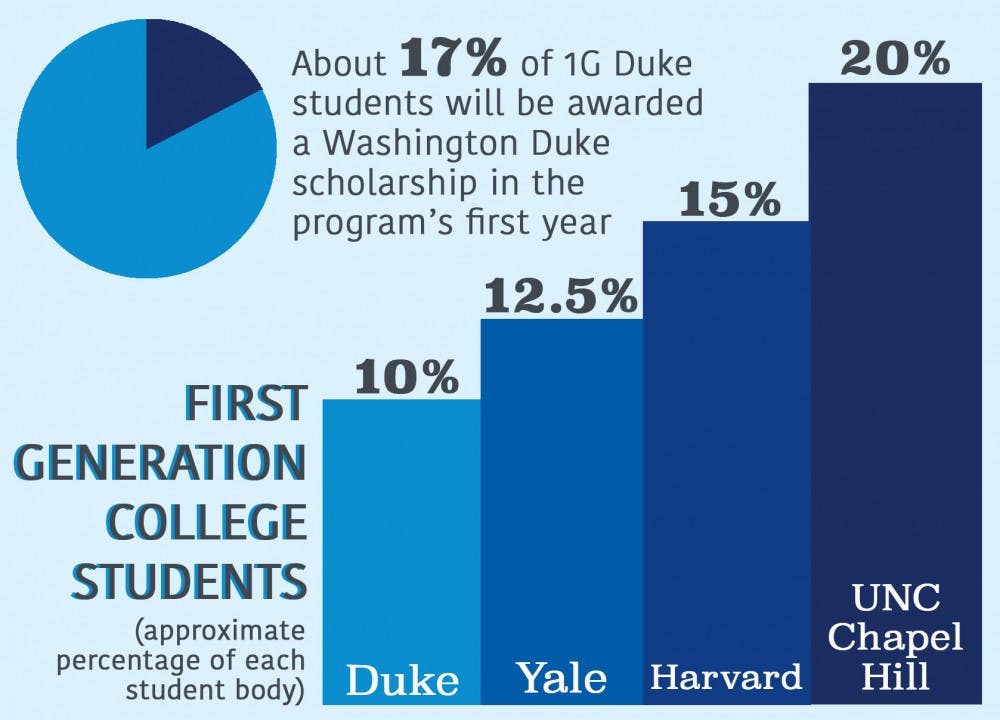Many first-generation college students on campus are pleased with the university’s new Washington Duke Scholars program, which builds on Duke’s commitment to supporting students from all backgrounds. But others acknowledge that the University still has a long way to go.
Announced by President Richard Brodhead last week, the Washington Duke Scholars program will provide first-generation students with a host of resources, including a four-week pre-orientation program, laptops, a professional readiness seminar and access to exclusive faculty and alumni interactions. In 2009, Duke started the 1G Network, a support system for first-generation students comprising a two-day pre-orientation program coupled with financial and academic support over the entire four years. Director of Access and Outreach Justin Clapp, who is in charge of the 1G Network, explained the importance of supporting first-generation college students academically, emotionally and financially.
“For many first-generation college students, success was fostered on one’s own,” Clapp wrote in an email. “This makes navigating complicated academic and social challenges a bit daunting.”
Sue Wasiolek, associate vice president for student affairs and dean of students, noted that first-generation students do not lack family support, but that their support system lacks experience with higher education.
Freshman Hunter McGhee agreed with Wasiolek, adding that the 1G program has played a positive role in bridging the gap.
“We don’t know what we’re getting into when we go to college,” he said. “Our support is different. We don’t have someone we can ask ‘How does this work?’, so we’re forced to be independent. It’s just a different experience. The 1G program was phenomenal, but the college can always do more.”
The creation of the Washington Duke Scholars program is an attempt at doing more. So far, first-generation college students have said they are very pleased with the steps the administration is taking to bolster the existing programs.
“Honestly, I think it’s fantastic,” sophomore Ashley Ericson said. “A lot of 1G students get caught up in college life and think they have to move on after pre-orientation, but knowing that there’s other resources throughout the year could be really influential.”
Some first-generation students reacted to the announcement in a more lukewarm fashion. Freshman Samantha Bouchal—an Angier B. Duke scholar and first-generation college student—acknowledged the good intentions at the heart of the new proposal, but also pointed out possible problems in the program’s effect on other scholarship groups.
“In my scholarship group, there is a lot of representation of privilege,” Bouchal said,“These kids, in order to have the resumes that they do, need to have access to certain resources that students who are first-generation or low-income do not have. One of my concerns is that the administration is going to feel as though the Washington Duke scholarship lets them off the hook with representing socioeconomic diversity in the scholarship population. This might be a dangerous segue into systematizing privilege in scholarship groups like the Benjamin N. Duke, Robertson and Angier B. Duke [programs].”
Bouchal also noted the fact that the Washington Duke Scholarship will only be awarded to approximately 30 individuals in the first year of the program, even though, in the past four years, each incoming class has included more than 150 first-generation college students on average.
Duke’s proportion of first-generation college students—about 10 percent—is slightly lower than some of its peer institutions. First-generation students make up close to 20 percent of the student body at the University of North Carolina at Chapel Hill, 15 percent at Harvard University and approximately 12.5 percent at Yale University.
“As a first-generation student myself, I’m really pleased that Duke has decided to move in this direction and acknowledge that this population of students is part of Duke’s diversity,” Wasiolek said, “This is a population of students that, with the right support, will thrive and flourish at Duke.”
The administration’s goal is that the Washington Duke Scholars program, in conjunction with the 1G Network, will attract more first-generation students to Duke and help them feel at home once they arrive on campus.
“As we continue to recruit and retain first-generation college students, everyone benefits,” Clapp wrote. “We will now have more opportunities for well-rounded discussion in the classroom, residence halls and study spaces. With a diverse and inclusive student body comes greater success and attainment among all students. I’m excited for all that this is happening.”
Get The Chronicle straight to your inbox
Signup for our weekly newsletter. Cancel at any time.

